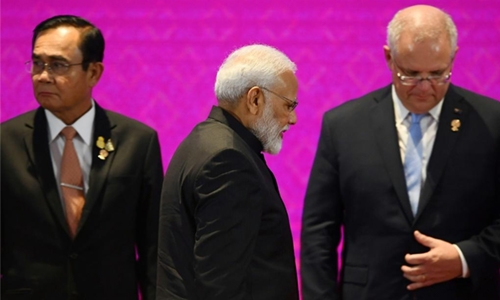India rejects RCEP trade deal
India said yesterday it would not join a sprawling Asian trade pact, raising fears over how domestic producers would be hit, in a major blow to the Beijing-backed deal. The Regional Comprehensive Economic Partnership (RCEP) was meant to account for 30 percent of global GDP and loop in half of the world’s people.
But India dug in over concerns about market access, fearing its domestic industries would be hard hit if the country was flooded by cheap Made-inChina goods. “We have conveyed to the participating countries that we will not be joining the RCEP,” Vijay Thakur Singh, a senior diplomat in charge of East Asia for India’s Ministry of External Affairs. “Our decision was guided by the impact this agreement will have on the ordinary human beings of India and livelihood of people, including the poorest of the poor,” she said.
“Present form of the RCEP Agreement does not fully reflect the basic spirit and agreed guiding principles of RCEP,” Modi was quoted saying by Indian public broadcaster Prasar Bharati News Services in a tweet. “It does not address satisfactorily India’s outstanding issues and concerns.” “It is not possible for India to join the #RCEP Agreement,” the broadcaster further quoted Modi as saying in the tweet. The dramatic pullout comes after frenzied negotiations at the Association of Southeast Asian Nations (ASEAN) summit in Bangkok, which closed Monday evening.
The meeting was dominated by trade issues -- with RCEP front and centre -- backlit by the crippling US-China tariff war threatening to drag global growth. The decision is major blow to the deal, which intended to loop in all 10 ASEAN states plus China, Japan, South Korea, Australia and New Zealand -- notably excluding the US. Remaining members said they were aiming to sign the deal next year, after legal review of the draft terms of the text agreed Monday.
The news came after a full day of meetings at the ASEAN summit in Bangkok, attended by the leaders of Japan, South Korea, and India, along with China’s premier. Notably absent was a top US official after Washington sent commerce secretary Wilbur Ross and national security advisor Robert O’Brien in lieu of President Trump.
‘Treated generously’
The decision raised diplomatic eyebrows in Bangkok and appeared to prompt several Southeast Asian leaders to skip a meeting with US officials on Monday. Just three leaders from the 10-member Association of Southeast Asian Nations (ASEAN) showed up to the session, along with a host of foreign ministers.
In attendance was the prime minister of Thailand, which is hosting the summit, along with the leaders of Laos and Vietnam, next year’s ASEAN chair. “It’s not appropriate for ASEAN to send leaders when the US representation is not on parity,” one diplomat in Bangkok told AFP. Trump, who attended the 2017 ASEAN meeting in Singapore -- Vice President Mike Pence went to the one in Manila last year -- could not come this year because he was busy with campaign events back home, a senior White House official said.
But O’Brien, Trump’s special envoy to ASEAN, shrugged off the apparent snub, describing “excellent conversations” with leaders. “Not being head of state, I was treated generously,” he said. O’Brien read a letter from the president inviting “the leaders of ASEAN to join me in the United States for a special summit” in the first three months of next year.
Open door
India’s decision dashed hopes of closing the RCEP deal at the summit after seven years of gruelling negotiations. A senior trade diplomat with knowledge of the negotiations said prime minister Narendra Modi did not budge because he was under domestic pressure.
But the diplomat held out the option that India could join at a “later date” even after it is signed, if outstanding issues are resolved. China’s deputy foreign minister Le Yucheng echoed that view. “Whenever India is ready, it is welcome to get on board,” he said before New Delhi confirmed its pullout. As negotiations were being finalised Monday, the ASEAN bloc and its allies espoused open trade in the region. “We are once again faced with the high winds of trade protectionism,” said South Korean leader Moon Jae-in.
“We need to protect the freetrade order... and bring the global economy back on track.” Ongoing troubles in the South China Sea also dominated the ASEAN summit, with the US and China trading barbs over the disputed waterway. O’Brien accused China of “intimidation” in the sea, while Beijing’s deputy foreign minister said outside countries should not meddle in the sea, which it claims most of.
Related Posts

